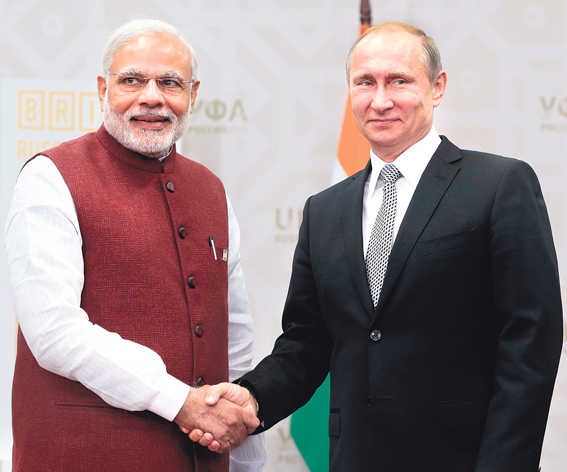
Fortify the robust defence partnership with Russia.
G Parthasarathy
PRESIDENT Putin talked tough on Syria in his New York meeting with President Obama. He signalled that Russia was no longer prepared to acquiesce in unilateral US actions in West Asia, despite American sanctions imposed on it, following its actions in Ukraine and Crimea. What has emerged is a more assertive Russian role, to challenge destabilising and disastrous American policies in Iraq, Libya and, most notably, Syria. Ill-advised US actions in West Asia have resulted in the rise of the barbaric ISIS and a massive refugee exodus from conflict zones, which has destabilised Europe. What is now emerging is an unannounced Russia-China partnership backed by Iran, Iraq and the Assad dispensation in Damascus to counter American unilateralism and dominance in West Asia.
Coincidentally, these Russian moves coincided with a visit to New Delhi on September 15 by Russian deputy foreign minister Gennady Gatilov. The Russian envoy focused on the expansion of membership of the UN Security Council and the situation in Syria. Gatilov paid lip service to support for India’s candidature for permanent membership of the UN Security Council. Moscow, thereafter, chose to join China and Pakistan in seeking to undermine the G-4 initiative in the UN General Assembly, which aimed for an early decision on restructuring the UN Security Council. Interestingly, no meeting was scheduled between Mr Modi and President Putin in New York. Moscow has made no secret of its concerns about the US getting an increasing share in defence acquisitions by India.
Faced with unrelenting US hostility and sanctions, Russia now appears to have taken a decision to respond strongly in West Asia and elsewhere. It will strengthen its partnership with China, even if it involves acting as a junior partner of China in crucial areas like the Afpak Region and in Central Asia, where China has seized effective control of access to energy resources. This has eroded the historical dominance of Moscow in the oil and gas sectors in its southeastern, Central Asian neighbourhood. In Afghanistan, Russia plays a silent partner to Chinese-Pakistani initiatives seeking “reconciliation” with the Taliban. This is happening even as the Taliban, joined by remnants of Chechen resistance and the Islamic Movement of Uzbekistan, seizes control of Kunduz, sending shivers down the spines of neighbouring Central Asian States like Uzbekistan and Tajikistan.
There has also been a noticeable Russian shift on relations with Pakistan, now described by Russian academics as Russia’s “South Asian Gatekeeper”, and even on Pakistan-sponsored terrorism. The India-Russia Joint Statement in 2003 called for the need for Pakistan “to dismantle the terrorist infrastructure in Pakistan and Pakistan-controlled territory (POK)”. The Russians now avoid mentioning any linkage between Pakistan and terrorism. This became noticeable after Pakistan foreign minister Hina Rabbani Khar and its army chief, General Kayani, visited Moscow in 2012 and issues of Russian defence supplies were broached. What followed was an agreement for Russia to supply RD 93 engines directly for JF 17 fighters being assembled in Pakistan with Chinese collaboration. Things moved further ahead after the recent visit of Gen Raheel Sharif to Russia, with deputy foreign minister Sergei Ryabkov, describing Pakistan as Moscow’s “closest partner” and promising to supply Pakistan advanced Sukhoi 35 fighters and MI 35 attack helicopters. Sukhoi 35 fighters are also being sold to China. Cash-strapped Pakistan, slated to acquire Israel-designed advanced J 10 fighters from China, can hardly afford to pay for expensive Russian fighter aircraft.
The modernisation of China’s arsenal over the last two decades has largely come about by the acquisition of equipment ranging from fighter aircraft and surface-to-air missiles to warships, from Russia. Moscow is, however, less than happy at the manner in which China has violated copyrights and reverse engineered defence equipment it has supplied to Beijing. But Moscow has few options now, faced with falling prices of oil, gas and other natural resources, amidst growing concerns in western Europe about excessive dependence on oil and gas supplies from Russia. At the same time, Russia is obviously miffed at the manner in which China reneged on a $400 billion, 30-year agreement on the purchase of Russian natural gas, reached with President Putin last year.
Russia is seeking to complement its own plans for a “Eurasian Union”, with China’s grandiose “one belt, one road” initiative, while envisaging expanding economic connectivity with Iran, SAARC and China. Its strategic thinkers would like to construct an Iran-Pakistan-India gas pipeline and extend it to China, while hoping that India could be persuaded to go along, even if the pipeline is constructed through POK. The military dimensions of this thinking can be gleaned from the fact that in recent months, there have been joint military exercises between China and Russia, not only on their Pacific shores, but also for the first time, on the shores of the Mediterranean Sea, even as Moscow was planning its Syrian deployments.
It remains to be seen whether given its economic limitations, Moscow can fulfil these grandiose plans. It will live to regret its U-turn on the Taliban, once the impact of Taliban medievalism is felt by its Central Asian partners. While the Taliban may appear like “good guys” in comparison to the ISIS, which has been reinforced by hundreds of Chechens, there is nothing to suggest that the Taliban have changed their ideological inclinations, or forsaken their erstwhile Chechen and Central Asian partners. Nor is there any reason to believe that Pakistan-backed groups like the Lashkar-e-Taiba and the Haqqani network are going to abandon their Islamist propensities.
India has experienced Moscow’s flirtations with Pakistan and China in the past and seen them end in disappointment for Russia. Moreover, the Russians cannot forget the enthusiasm with which Mao and Deng made U-turns to embrace the US. New Delhi will hopefully strengthen its extensive engagement with Moscow and advise it on how best its firms can take advantage of its new “Make in India” policies, while strengthening their robust defence partnership. At the same time, Moscow would be well advised to understand precisely what India’s concerns are.



























